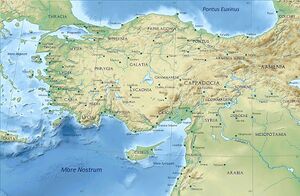Heraclea
| Author: Laxman Burdak, IFS (R). |

Heraclea, known in Byzantine and later times as Pontoheraclea, was an ancient city on the coast of Bithynia in Asia Minor, at the mouth of the river Lycus.
Variants
- Heraclea (Pliny.vi.18, Pliny.vi.39)
- Heraclea Pontica (/ˌhɛrəˈkliːə ˈpɒntɪkə/; Greek: Ἡράκλεια Ποντική, romanized: Hērakleia Pontikē)
- Pontoheraclea (Greek: Ποντοηράκλεια, romanized: Pontohērakleia)
- Harakli
- Eregli
Jat Gotras Namesake
History
Heraclea was founded by the Greek city-state of Megara[1] in approximately 560–558 BC and was named after Heracles who the Greeks believed entered the underworld at a cave on the adjoining Archerusian promontory (Cape Baba). The site is now the location of the modern city Karadeniz Ereğli, in the Zonguldak Province of Turkey.
The colonists soon subjugated the native Mariandynians but agreed to terms that none of the latter, now helot-like serfs, be sold into slavery outside their homeland. Prospering from the rich, fertile adjacent lands and the sea-fisheries of its natural harbor, Heraclea soon extended its control along the coast as far east as Cytorus (Gideros, near Cide), eventually establishing Black Sea colonies of its own (Cytorus, Callatis and Chersonesus). It was the birthplace of the philosopher Heraclides Ponticus.
The prosperity of the city, rudely shaken by the Galatians and the Bithynians, was utterly destroyed in the Mithridatic Wars.
The Greek historical author Memnon of Heraclea (fl. 1st century AD) wrote a local history of Heraclea Pontica in at least sixteen books. The work has perished, but Photius's Bibliotheca preserves a compressed account of books 9–16, seemingly the only ones extant in his day. These books run from the rule of the tyrant Clearchus (c. 364–353 BC) to the later years of Julius Caesar (c. 40 BC) and contain many colorful accounts including the Bithynian introduction of the barbarian Gauls into Asia where they first allied themselves with the Heracleans and later turned violently against them.
Then, Heraclea Pontica was part of the (Eastern) Roman Empire for more than 1000 years. The Turks ravaged the area after the Battle of Mantzikert in 1071. David Komnenos, brother of the ruler of Trebizond Alexios I of Trebizond, took Heraclea Pontica in 1205 and made it capital of his domain, called Paphlagonia; he lost it in 1214 to Theodore I Laskaris, who made it a major frontier bulwark. The Genoese had a colony there after 1261. When the Turks conquered Paphlagonia in 1360, Genoa bought the city from the weakening Byzantine Empire. Heraclea developed as a trading centre of the Genoese, who settled there in large numbers. A ruined citadel on a height overlooking the town is a remnant of this period. The Italian name of the city was Pontarachia.[2] The Genoese held the city until the Ottomans captured it after 1453.[3][4]
Mention by Pliny
After leaving the Sagaris the Gulf of the Mariandyni15 begins, and we come to the town of Heraclea16 on the river Lycus17; this place is distant from the mouth of the Euxine two hundred miles. The sea-port of Acone18 comes next, which has a fearful notoriety for its aconite or wolf's-bane, a deadly poison, and then the cavern of Acherusia19, the rivers Pædopides, Callichorus, and Sonautes, the town of Tium20, distant from Heraclea thirty-eight miles, and the river Billis.
15 The modern Gulf of Sakaria. Of the Mariandyni, who gave the ancient name to it, little or nothing is known.
16 Its site is now known as Harakli or Eregli. By Strabo it is erroneously called a colony of Miletus. It was situate a few miles to the north of the river Lycus.
17 Now called the Kilij.
18 Stephanus Byzantinus speaks of this place as producing whetstones, or ἀκοναὶ, as well as the plant aconite.
19 This name was given to the cavern in common with several other lakes or caverns in various parts of the world, which, like the various rivers of the name of Acheron, were at some time supposed to be connected with the lower world.
Mention by Pliny
Pliny[5] mentions 'Nations situated around the Hyrcanian Sea.'....Beyond the nations already mentioned, are the Chorasmii,13 the Candari,14 the Attasini, the Paricani, the Sarangæ, the Marotiani, the Aorsi,15 the Gaëli, by the Greek writers called Cadusii,16 the Matiani, the city of Heraclea,17 which was founded by Alexander,
13 An extensive tribe of 'Sogdiana, now represented by the district of Khawarezm, in the desert country of Khiva.
14 A tribe in the north-western part of Sogdiana. They appear to have been situate to the east of the district of Khawarezm. It has been suggested that they derived their name from the Sanscrit Gandharas, a tribe beyond the Indus.
15 The chief seat of the Aorsi, who appear to have been a numerous and powerful people both of Europe and Asia, was in the country between the Tanais, the Euxine, the Caspian, and the Caucasus. It seems doubtful, however, whether it is these people who are alluded to in the present passage.
16 These would almost seem to be a different people from those mentioned in c. 15 of the present Book, as dwelling in Atropatene. The present appears to have been a tribe of Sogdiana.
17 Strabo mentions a town of this name, which he places, together with Apamea, in the direction of Rhagæ. If Pliny has observed anything like order in his recital of nations and places, the Heraclea here mentioned cannot be that spoken of by Strabo, but must have been distant nearly 1000 miles from it.
External links
References
- ↑ For report of Boeotian involvement see Pausanias 5.26.7
- ↑ "Genoese portolan nautical chart. The oldest original cartographic artifact in the Library of Congress. Second quarter of the 14th century".
- ↑ Kazhdan, Alexander P. - The Oxford Dictionary of Byzantium - Volume 2 (1991, Oxford University Press), entry "Herakleia Pontike"
- ↑ "Encyclopedia Britannica - entry 'Ereğli'".
- ↑ Natural History by Pliny Book VI/Chapter 18
Back to Places

